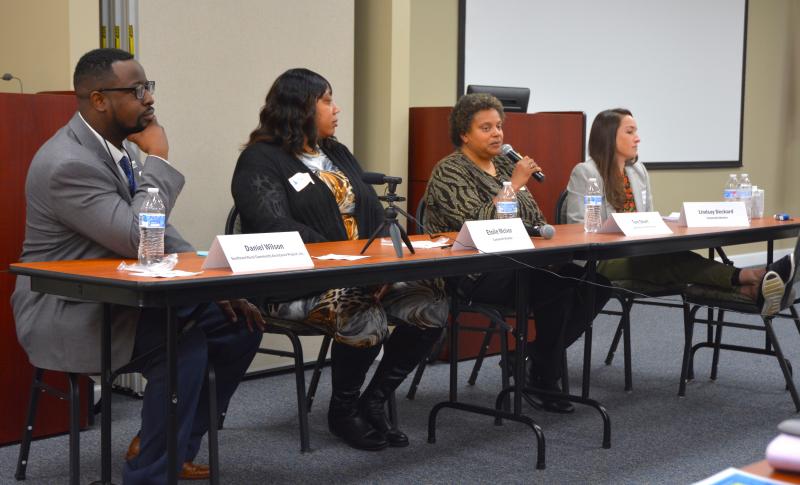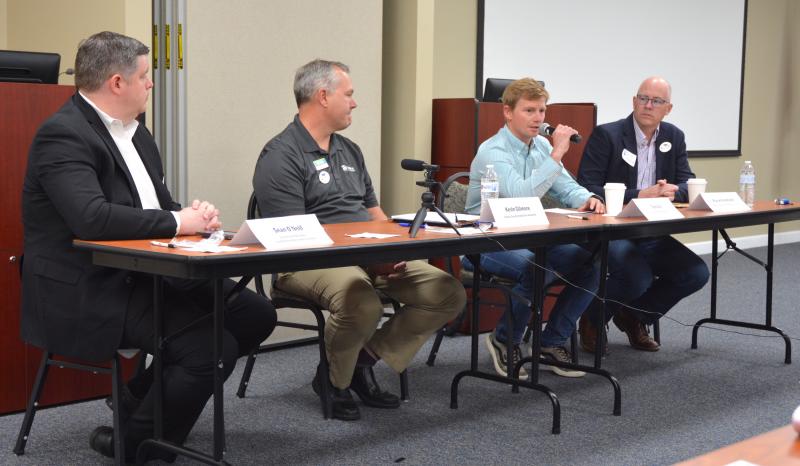Forum: Sussex has affordable housing woes

Is affordable housing along Sussex County’s coast a problem? Yes, but people might be forgiven if they thought they could move farther inland and find an affordable place to live. However, during an April 22 symposium hosted by Sussex Housing Group, panelist after panelist shed light on why it’s becoming more and more difficult to find affordable housing anywhere in the county.
“There are many, many challenges,” said Trina Joyner, a real estate agent at the Coldwell Banker Resort Realty Seaford office.
Joyner said inventory is low and basically nonexistent for many first-time home buyers. They can’t find anything under $250,000, she said.
Add to that the 4 percent transfer tax and it’s a shocker to see, said Joyner, voicing her support for a bill before the General Assembly right now that would lower the tax back to 3 percent.
It’s just as tough for renters, said Joyner. Rent can be almost twice as much as a mortgage, but sometimes a person doesn’t have the credit history to make that next step, she said.
Joyner was one of two dozen panelists who took part in the morning-long symposium, Affordable Housing – Myth or Reality, held at the Sussex County Association of Realtors’ Georgetown office. Panelists included business owners, community members, affordable housing developers and more.
Kim Blanch, a population health nurse for Beebe Healthcare, recalled visiting patients who endure horrible living conditions but can’t afford to move, and even sub-standard living conditions are better than being homeless.
Blanch said COVID pushed the healthcare industry to its limits, but there were staffing shortages before the pandemic began. Hospital staff work long hours, and then to throw in a long drive to and from work is not good, she said.
Speaking specifically of temporary summer employees, Scott Thomas, Southern Delaware Tourism executive director, said group housing opportunities have dried up in the coastal communities. Market pressure is pushing them farther from the coast, he said.
Dr. Jennifer Fuqua, La Esperanza executive director, said the last census shows Sussex County is 13 percent Hispanic. That’s an undercount, she said.
People are coming up with creative solutions to house their families because they’re living close to the edge of their financial safety net and are in fear of being evicted, said Fuqua. Many of these workers are paying taxes without seeing the benefits, such as the availability of COVID relief funds, she said.
Property owners accepting offers on day-old listings make up part of the problem. Daniel Wilson, a technical assistance specialist for Southeast Rural Community Assistance Project, Inc., said he lives in Kent County now but is looking for a place in Sussex. Even with a VA loan, he can’t act quickly enough, he said.
There were a number of panelists representing themselves as community members.
Etoile McIvor said the process to get approved for loans or to sign rental agreements is too cumbersome. A person needs a credit score above 640 and must make at least $3,000 a month, and there are a lot of scams when looking for houses, she said.
McIvor said creditors aren’t much help, because they might advise someone to do this, this and this, but when that client leaves the meeting, they don’t know how to begin, she said.
That’s why, said Toni Short, Lighthouse for Broken Wings executive director, there need to be housing coaches. Mortgage companies are difficult to deal with and people need help to get to know the system, she said.
Adding to everything, income wages in Sussex County haven’t kept up with costs, said Short.
Another community member was Lindsay Deckard, who has been suffering from Lyme disease for years. She said housing for people with disabilities in Sussex County is difficult to find.
Houses are too big, and there aren't one-story units or places that have elevators, said Deckard. She wants to be an active member of society, but taking care of herself and constantly having to search for housing are both full-time jobs.
Russ Huxtable, Milford Housing Development Corporation vice president and chief operating officer, said he would like to see a multi-layered approach to helping people, because voluntary, market-driven solutions aren’t working. If it's affordable, that doesn’t mean it’s cheap, he said.
Tom Ayd, principal at Salisbury-based Green Street Housing, said they don’t have any new developments being built in Sussex County because the process is too complicated. Buying open tracts of land is competitive, with long timelines, which is difficult for a business trying to build affordable housing, he said.
“I don’t have anything in Sussex County because we don’t have trust that it can get through the process,” said Ayd, estimating that, on the low end, an affordably built house is still going to cost $316,000 after tax credits bring down costs on his end.
Land cost is one of the biggest obstacles, said Kevin Gilmore, Sussex County Habitat for Humanity chief executive officer. It costs twice as much to buy a lot as it did a few years ago, he said.
The cost of land is a reason why Habitat has begun looking at neighborhood revitalization projects in addition to new construction, said Gilmore.
Having affordable housing is a way to help solve an upstream problem, because if some renters can afford to buy and then move, other renters can move up and allow new ones into the market, said Ayd.

Chris Flood has been working for the Cape Gazette since early 2014. He currently covers Rehoboth Beach and Henlopen Acres, but has also covered Dewey Beach and the state government. He covers environmental stories, business stories and random stories on subjects he finds interesting, and he also writes a column called Choppin’ Wood that runs every other week. He’s a graduate of the University of Maine and the Landing School of Boat Building & Design.
















































